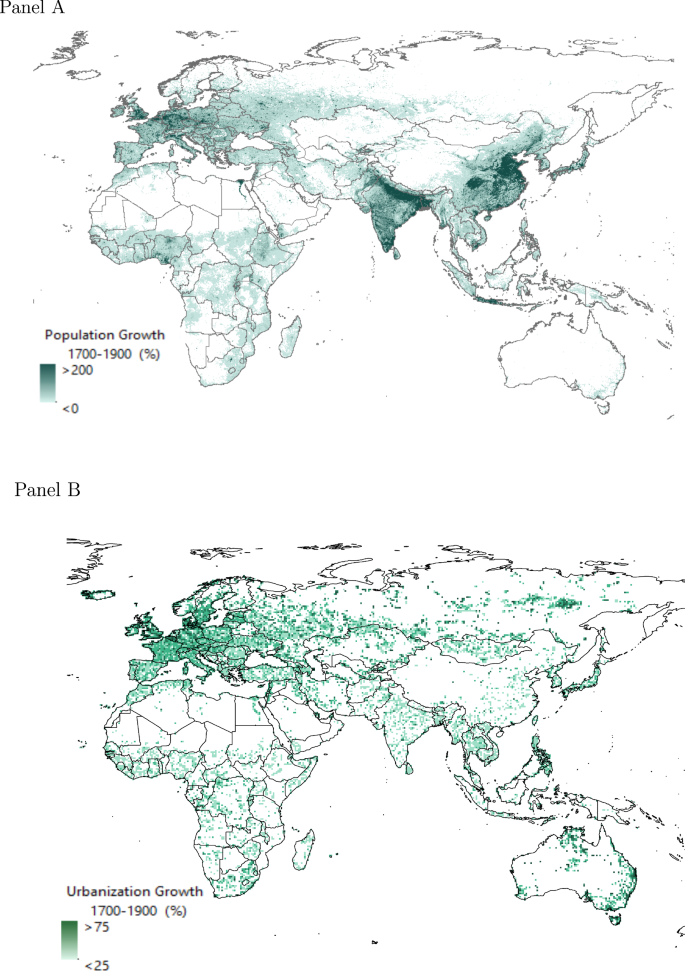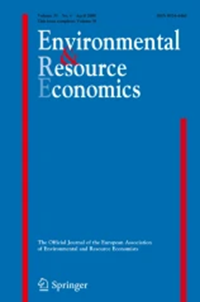蚊子和土豆:当地气候条件如何阻碍发展
IF 3.4
3区 经济学
Q1 ECONOMICS
引用次数: 0
摘要
马铃薯在旧大陆的历史传播是技术创新对社会经济增长和发展贡献的一个例子(Nunn和Qian in Q J economics 126(2): 593-650, 2011)。另一方面,与气候有关的疾病可能会抵消其中的一些好处。在这里,我们研究了疟疾对18世纪和19世纪旧大陆由土豆驱动的人口增长和城市化的长期影响。我们利用马铃薯和疟疾传播环境适宜性的地方差异,在高度空间分解的情况下,估计和比较马铃薯种植对高流行区和非流行区人口和城市化的影响。我们发现,适合疟疾传播的当地气候条件抵消了将马铃薯引入旧大陆的潜在好处,相反,在非疟疾流行地区,马铃薯的潜在好处被发现是强大和积极的。这些结果突出了技术变革、公共卫生和发展成果之间的相互作用。本文章由计算机程序翻译,如有差异,请以英文原文为准。

Mosquitoes and Potatoes: How Local Climatic Conditions Impede Development
Abstract The historical diffusion of the potato in the Old World serves as an example of the contribution of technological innovations to socio-economic growth and development (Nunn and Qian in Q J Econ 126(2):593–650, 2011). Climate-related diseases, on the other hand, might offset some of these benefits. Here we examine the long-term impact of malaria on the potato-driven growth of the population and urbanization in the Old World during the 18th and 19th centuries. We exploit local variations in environmental suitability both for potato and for malaria transmission to estimate and compare the impact of potato cultivation on population and urbanization in highly endemic to non-endemic areas at a high level of spatial disaggregation. We show that local climate conditions ideal for malaria transmission counteracted the potential benefits of introducing the potato to the Old World, which are conversely found to be strong and positive in non-endemic regions. These results highlight the interplay between technological change, public health, and development outcomes.
求助全文
通过发布文献求助,成功后即可免费获取论文全文。
去求助
来源期刊

Environmental & Resource Economics
Multiple-
CiteScore
10.20
自引率
3.40%
发文量
100
期刊介绍:
The primary concern of Environmental & Resource Economics (ERE) is the application of economic theory and methods to environmental issues and problems that require detailed analysis in order to improve management strategies. The contemporary environmental debate is in a constant state of flux and new or relatively unexplored topics are continually emerging. The Journal provides a forum for the further exploration of the causes, consequences and policy responses linked to these topics, across a range of spatial and temporal scales up to the global dimension. Contributions to the Journal should directly or indirectly be relevant to the policy formulation and application process. Areas of particular interest include: evaluation and development of instruments of environmental policy; cost-benefit and cost effectiveness analysis; sectoral environmental policy impact analysis; modelling and simulation; institutional arrangements; resource pricing and the valuation of environmental goods; environmental quality indicators. The editors wish to encourage a pluralistic approach to both theoretical and applied contributions. The publication of empirically based, policy-oriented research is given a high priority in the Journal in order to further critical discussion. Environmental & Resource Economics will also accept papers with an interdisciplinary approach, where this helps to improve knowledge of the real world complexities present, provided that the analysis retains links to or components of economic thinking. The Journal is required reading for economists, economic geographers and other academics, professionals and officials with a working interest in environmental matters.
 求助内容:
求助内容: 应助结果提醒方式:
应助结果提醒方式:


